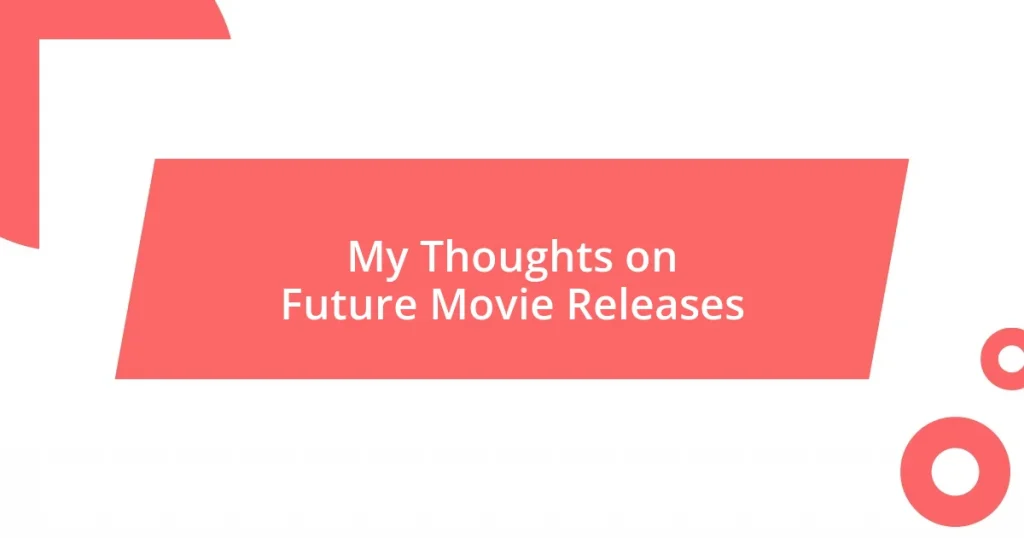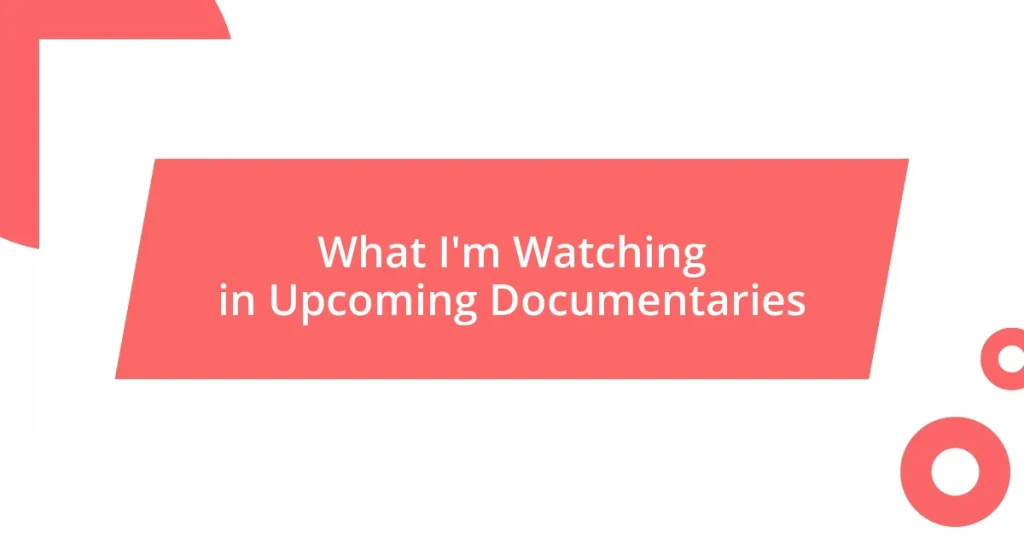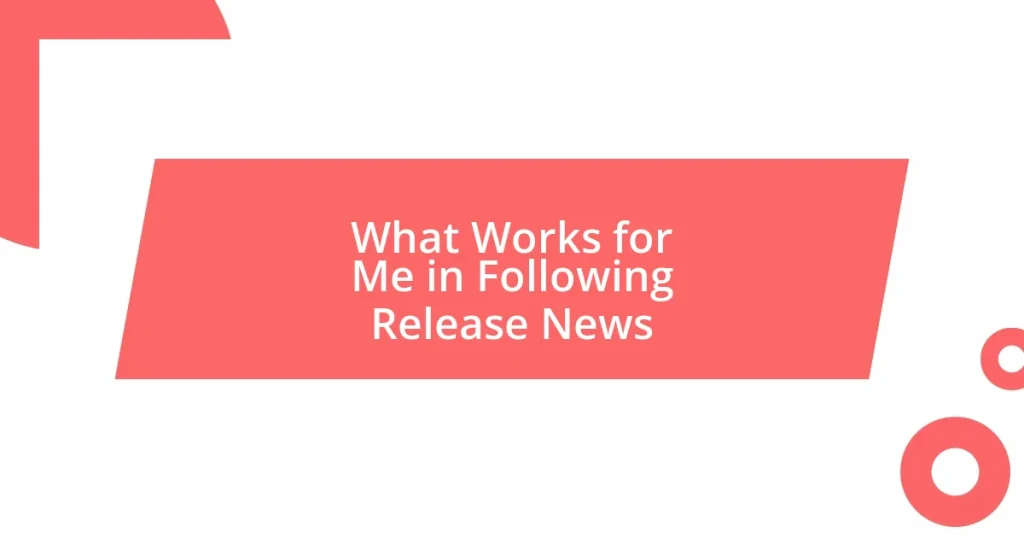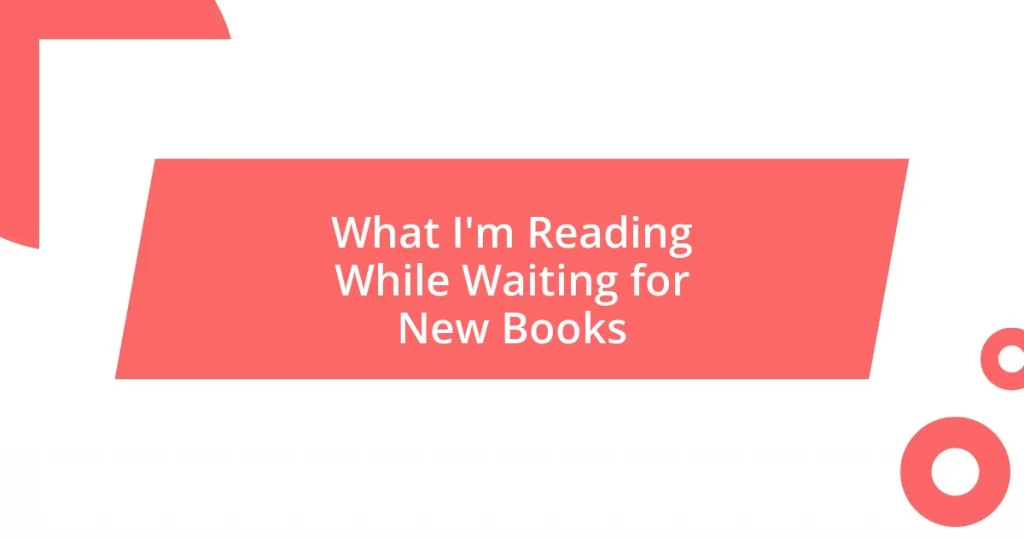Key takeaways:
- The future of movie releases is poised to embrace innovative formats like virtual reality and interactive storytelling, enhancing emotional engagement and diverse narratives.
- Key filmmakers such as Greta Gerwig, Jordan Peele, and Kevin Feige are shaping modern cinema through fresh, relatable narratives, social commentary, and diverse representation.
- Streaming services are transforming audience access and filmmaking approaches, creating opportunities for niche storytelling and altering viewing habits, fostering community connections beyond traditional theaters.
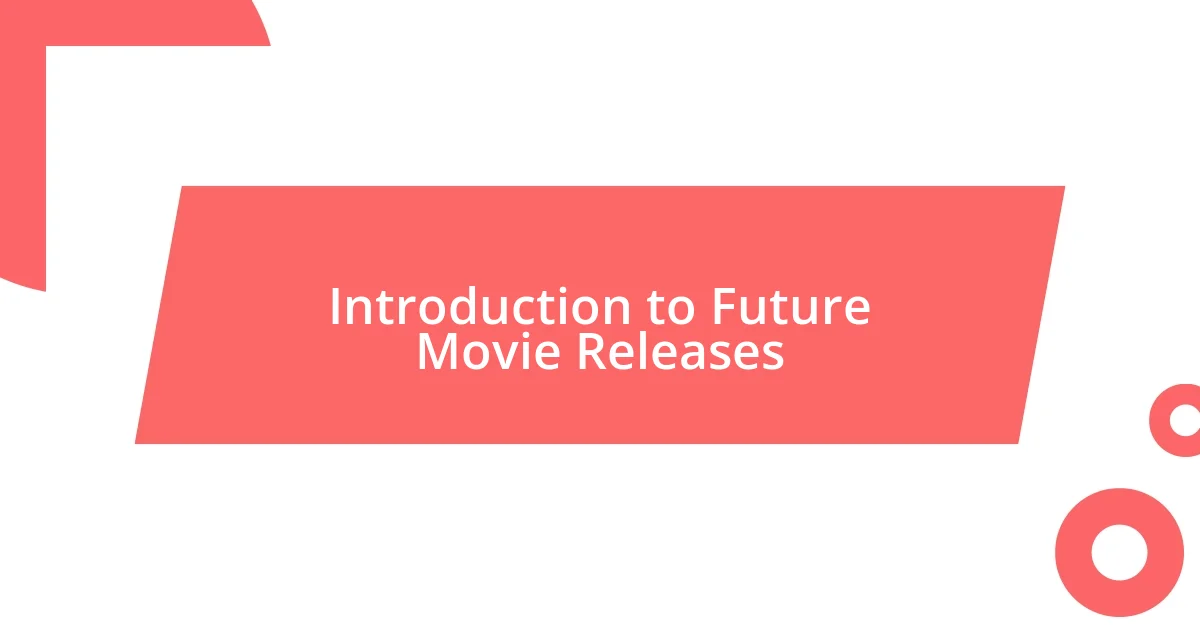
Introduction to Future Movie Releases
The future of movie releases is something I find incredibly exciting. With advancements in technology and storytelling, we are stepping into an era where films can transcend our traditional expectations. Have you ever considered how innovative formats, like virtual reality or interactive storytelling, could reshape our viewing experiences?
I remember the thrill of watching a film for the first time with my friends, discussing every plot twist and character arc. As we look forward to upcoming releases, it’s fascinating to think about how these films might evoke deep emotional responses or provoke meaningful discussions. I believe the next wave of movies could not only entertain but also challenge us to think differently about the world around us.
As we explore the potential of future releases, I’m curious about what genres will rise to prominence. Will we see more diverse voices and stories? I feel that exploring varied perspectives is essential for enriching our collective narrative. It’s this thought that truly captivates me—imagining how films can continue to evolve and resonate deeply with audiences in ways we haven’t even begun to experience.
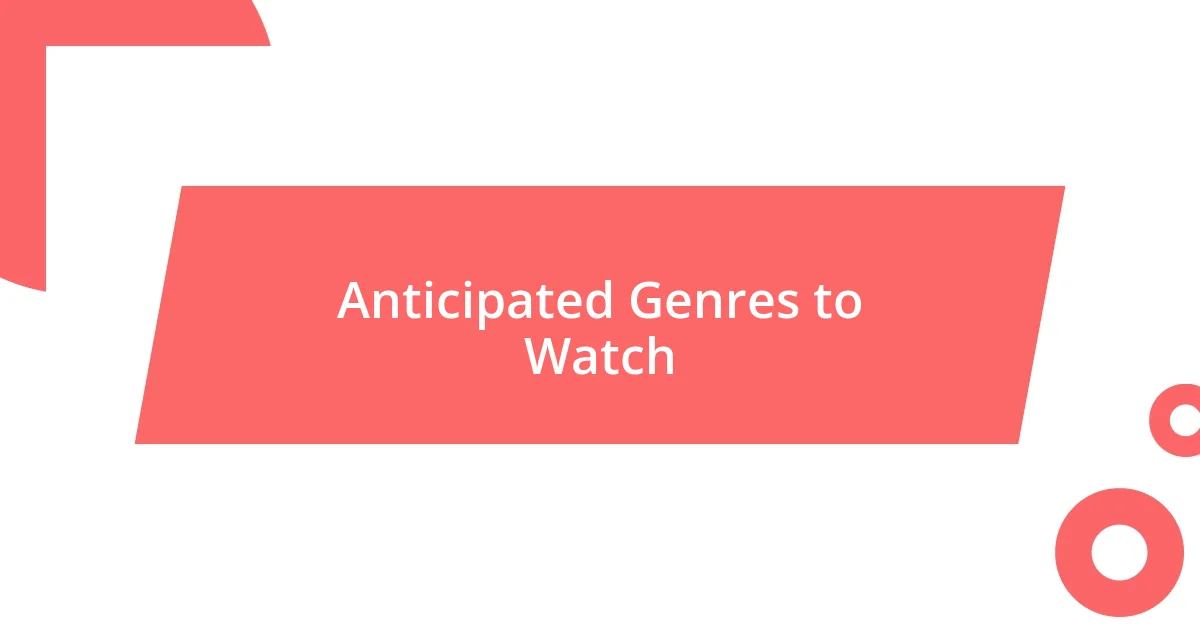
Anticipated Genres to Watch
When I think about the genres that are gathering momentum, I can’t help but get excited about horror and sci-fi. Both genres allow for profound exploration into human fears and aspirations, often reflecting societal issues. I remember sitting on the edge of my seat during a gripping sci-fi thriller, feeling the intertwining of technology and ethics resonate with my own curiosities about the future. I believe these genres are not only here to scare or entertain but to spark crucial conversations about where we might find ourselves down the line.
- Horror: Expect innovations that challenge psychological norms, such as the blending of reality and fiction.
- Fantasy: Look for more inclusive storytelling, creating worlds that reflect diverse cultures and experiences.
- Science Fiction: Anticipate narratives that tackle urgent themes, like climate change, AI ethics, and space exploration.
- Documentary-Drama: A rise in films that intertwine real events with dramatized narratives could lead to powerful storytelling.
- Animated Features: These might explore deeper themes, allowing creative liberties that can not only entertain but also educate.

Key Filmmakers Shaping Trends
Filmmakers are the heartbeat of the industry, and certain individuals are truly driving the trends we’re witnessing today. For instance, Greta Gerwig’s recent successes have reshaped family drama and comedy, infusing them with fresh, relatable narratives. I recall the emotional weight I felt during Little Women; it made me reflect on my own familial connections, showcasing how filmmakers can turn personal stories into universal truths.
Equally influential is Jordan Peele, who has brought a new perspective to horror. His unique ability to blend social commentary with thrilling storytelling is something I admire deeply. Watching Get Out for the first time was a transformative experience for me—his films not only entertain but also serve as mirrors to societal issues, prompting us to think critically about the world around us.
Not to be overlooked, Marvel’s Kevin Feige continues to shape the blockbuster landscape, ensure diverse representation and innovative storytelling in superhero films. The sense of community I felt while watching Black Panther premiere is something I can’t forget—a celebration of culture and a leap forward in representation. It reminds me that the power of cinema lies in its ability to connect us all through shared experiences.
| Filmmaker | Notable Trends |
|---|---|
| Greta Gerwig | Redefining family narratives, blending humor with emotional depth |
| Jordan Peele | Social commentary through horror, pushing genre boundaries |
| Kevin Feige | Diverse representation in blockbusters, fostering interconnected storytelling |
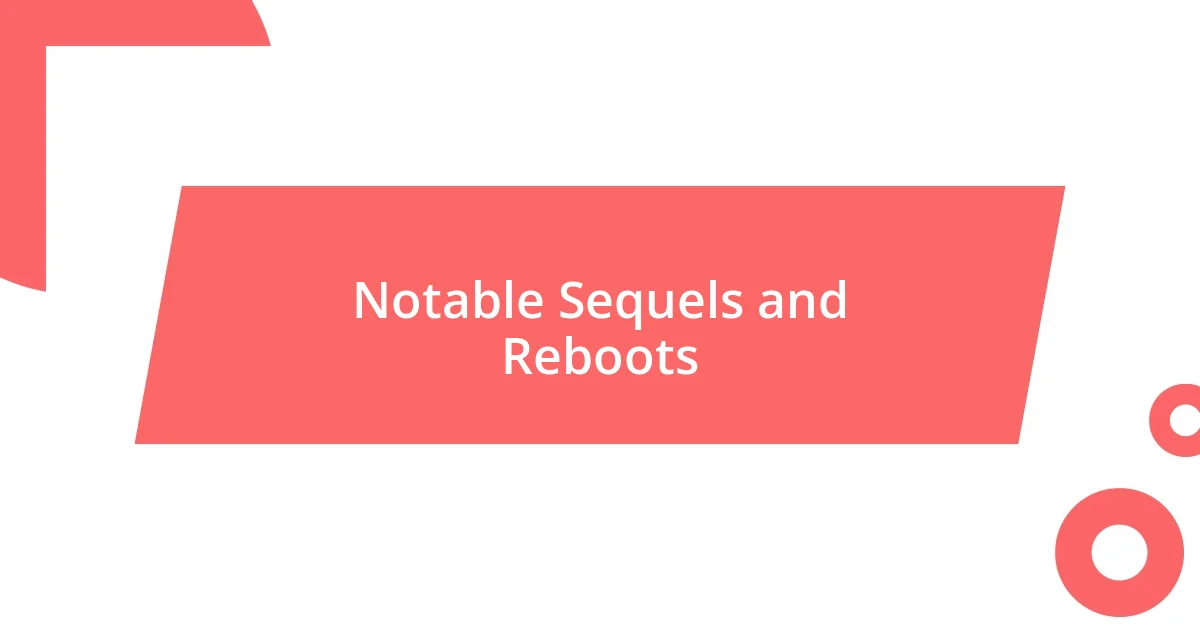
Notable Sequels and Reboots
The world of sequels and reboots is always a hot topic in cinema discussions, often stiring both excitement and skepticism. Take, for instance, the recent revival of Ghostbusters. I distinctly recall the thrill of watching the original with my friends as kids, laughing at the humor and enjoying the camaraderie on screen. The reboot didn’t just serve nostalgia; it cleverly brought a new generation into the fold while honoring the classic. It makes me ponder—can a sequel truly capture the magic of its predecessor while paving a fresh path?
When we think about notable sequels, Top Gun: Maverick sits atop my list. It’s not just another action film; it resonates deeply, reminding us of the passage of time and the weight of past choices. I remember sitting in the theater and feeling a wave of emotions hit me as I watched familiar faces and thrilling aerial stunts. It begs the question—what is it about returning to beloved characters that makes us feel so connected? For me, it’s about witnessing growth and change, both in them and myself.
Reboots, on the other hand, often elicit mixed feelings. The forthcoming The Matrix Resurrections has my curiosity piqued, as that original trilogy shaped my understanding of sci-fi and philosophy. I can still vividly recall the discussions my friends and I had about reality and free will after watching it. Can this new installment reignite that conversation and introduce a new layer for audiences? I find myself hopeful yet cautious, eager to see how they’ll honor the legacy while making it relevant for today’s viewers.
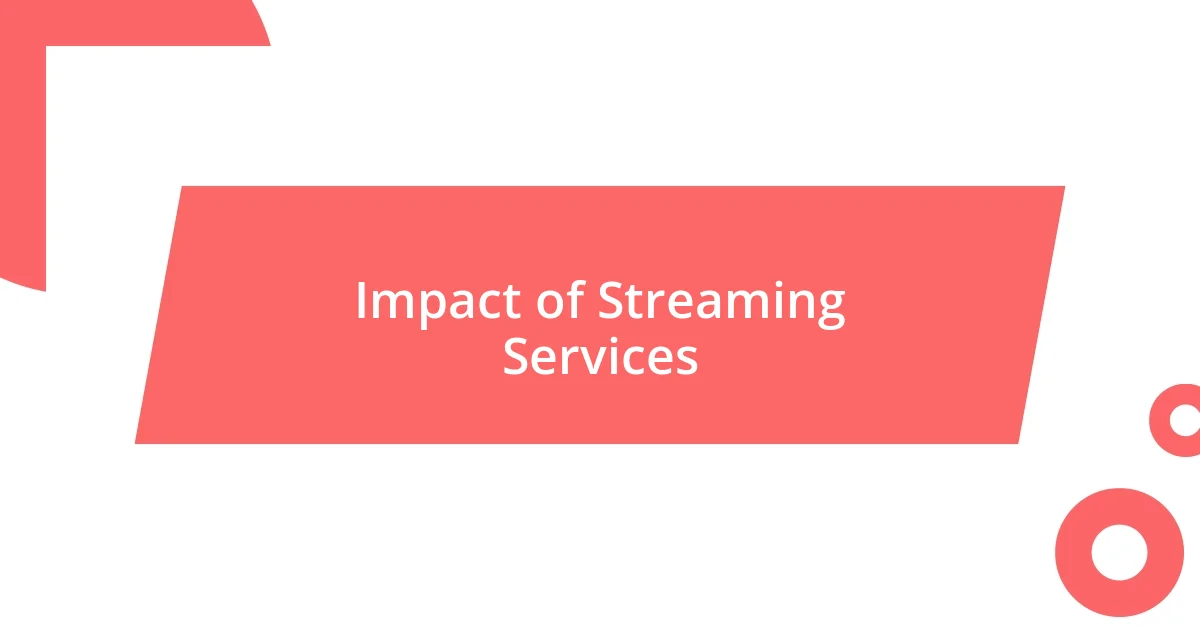
Impact of Streaming Services
Streaming services have undeniably transformed the landscape of movie releases, granting audiences unprecedented access to a vast array of content. I vividly remember the first time I binge-watched an entire season of a show on a streaming platform—it was a game-changer for my viewing habits, allowing me to immerse myself in storytelling like never before. Isn’t it fascinating how easily we can dive into diverse genres without the constraints of traditional scheduling?
Moreover, these platforms are reshaping how filmmakers approach their craft. The rise of original content has empowered creators to explore niche topics and tell underrepresented stories. I recently watched a gripping documentary on a streaming service that opened my eyes to a social issue I was previously unaware of. It made me wonder—how many more stories are out there waiting to be told, breaking free from the mainstream mold thanks to the flexibility that streaming offers?
As a viewer, I often find myself pondering the implications of this shift. Sure, traditional cinemas have their charm, but the convenience of streaming allows friends to have movie nights from the comfort of home, no matter where they are. I recall hosting a virtual movie night during the pandemic, where we all streamed a new release together while chatting online—it felt oddly connected, even though we were miles apart. Could this be a glimpse into the future of movie-watching, where community transcends physical spaces?

Predictions on Box Office Success
Predictions about box office success can be as thrilling as they are uncertain. I recall the buzz surrounding the release of Avengers: Endgame. The energy in the theater was palpable, with fans eager to see how the story would unfold. It makes me wonder—are we heading towards a similar collective excitement for upcoming blockbuster franchises that manage to blend stellar storytelling with high-stakes visuals?
In my opinion, films that successfully leverage social media and fan engagement will likely see significant box office success. I think back to when Frozen II launched a viral campaign featuring catchy songs and heartwarming messages. Seeing how quickly my friends were sharing clips and singing along highlighted the power of community in driving ticket sales. Does this mean that future blockbusters will need to harness similar social strategies to captivate audiences?
Furthermore, I believe films that tackle current social issues or resonate emotionally will also perform well. For example, I remember how Joker sparked discussions about mental health, and it drew audiences in by connecting on a personal level. It raises a crucial question: Can filmmakers strike the right balance between substance and entertainment to entice viewers back to theaters? I’m optimistic that as stories continue to evolve, so too will their box office fortunes.

Conclusion and Personal Insights
Reflecting on the future of movie releases, I can’t help but feel a mix of excitement and uncertainty. The blend of streaming innovations and traditional releases seems to create a unique landscape for filmmakers and audiences alike. I often think about how this dynamic influences my viewing preferences—like when I decided to skip the cinema for a much-anticipated film and opted to watch it at home instead. Did I miss out on the big-screen experience, or did I gain something just as valuable in comfort and accessibility?
The emotional connection I forge with films is evolving; it’s no longer just about the plot but also about how and when I choose to engage. I remember a moment watching a poignant indie film late at night on my couch, wrapped in a blanket, feeling every beat of the story. It made me realize how the environment shapes my connection to the film. Will future movies prioritize making us feel more deeply, regardless of the platform we choose to enjoy them on?
Looking ahead, I wonder how audiences will balance their craving for blockbuster excitement with the desire for more intimate storytelling. There’s a bittersweet nostalgia for gathering with friends in theaters, yet streaming has opened doors to unexpected gems I might never have discovered otherwise. It leaves me pondering: as the industry continues to shift, will we embrace a new era where every film can find its audience, whether in a packed theater or a quiet living room?










